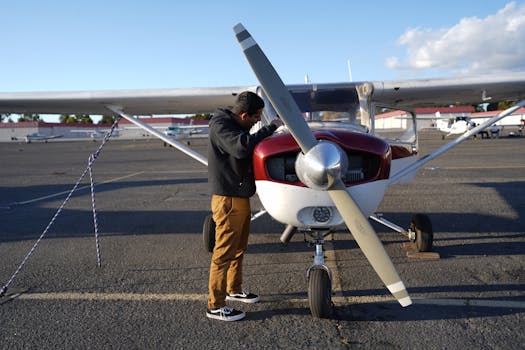You can do a security first line manager advanced apprenticeship.
Entry requirements
Most people following this route have:
- experience in related work
An Airport Operations Manager is responsible for the smooth and safe running of day-to-day operations at an airport. This role involves coordinating teams across different areas such as security, customer service, baggage handling, and airfield operations. Duties include managing staff, overseeing compliance with safety and security regulations, responding to incidents or emergencies, and ensuring flights run on schedule. The job requires strong leadership skills, the ability to work under pressure, and excellent communication abilities. Airport Operations Managers often work closely with airlines, government agencies, and other organisations to ensure a high standard of service for passengers and efficient airport operations.

Airport Operations Managers in the UK typically earn between £35,000 and £65,000 per year, depending on experience and the size of the airport.
There are over 40 major commercial airports in the UK, with hundreds of operations management roles available across the sector.
Most Airport Operations Managers work 37 to 40 hours per week, often on a shift pattern that may include early mornings, evenings, weekends, and bank holidays.

Oversees the safe and efficient movement of aircraft, vehicles, and personnel on the airfield, ensuring all airside operations comply with safety regulations.

Manages the teams responsible for passenger check-in, boarding, and customer service within the airport terminal, focusing on delivering excellent service and smooth traveller experiences.
Coordinates the logistics and staff involved in baggage handling, ensuring luggage is processed quickly and securely from check-in to aircraft and onward to arrivals.
Obtain GCSEs including English and Maths, which are essential for further study.
Most roles in airport management require a good standard of general education. Focus on achieving at least five GCSEs at grades 4-9 including English and Mathematics. Consider taking subjects that develop communication and problem-solving skills.
Study for A-levels or a Level 3 Diploma, ideally in business, travel and tourism, or a related subject.
A-levels in business, geography, or travel and tourism can provide a strong foundation. Alternatively, a Level 3 Extended Diploma in Travel and Tourism or a similar course is valued by employers. These courses will introduce you to the basics of the industry.
Consider a university degree in airport management, aviation management, or business management.
Many airport operations managers have degrees in subjects such as aviation management, business management, or logistics. These degrees cover topics like airport planning, safety regulations, and leadership skills. Some universities offer specialist courses in aviation or airport management.
Apply for entry-level positions at airports, such as customer service assistant or ground operations staff.
Hands-on experience is highly valued in airport operations. Working in roles such as check-in staff, baggage handling, or security provides insight into airport procedures and regulations. These roles also help you develop skills in teamwork and dealing with the public.
Seek opportunities for promotion to team leader or supervisor positions within the airport.
Demonstrating leadership and reliability can lead to promotion. Supervisory roles involve managing a team, organising shifts, and ensuring smooth operations in specific areas of the airport. This experience is essential for moving into management positions.
Complete professional training courses in airport operations, safety, and security.
Many employers provide access to specialist training courses covering topics such as aviation security, health and safety, emergency procedures, and airport regulations. These certifications are often required for management roles.
Keep up to date with changes in aviation law and airport safety standards.
The aviation industry is highly regulated. Successful managers regularly attend workshops and read industry publications to stay current with laws and best practices, which is vital for ensuring compliance and effective operations.
Update your CV to highlight your qualifications and relevant experience, then apply for airport operations manager positions.
Tailor your CV to showcase leadership experience, industry knowledge, and any specialist training you have completed. Use job boards, company websites, and professional networks to find vacancies at airports across the UK.
Practise answering questions about your experience, leadership skills, and knowledge of airport operations.
Interviews for airport operations manager roles often include scenario-based questions and assessments of your ability to manage teams and handle emergencies. Prepare examples of how you have dealt with challenges in the past.
Explore relevant apprenticeships that can help you kickstart your career in Airport Operations Manager. Apprenticeships offer hands-on experience and training while earning a wage.
This page showcases various career options and the pathways to reach them. Each career listed here shares transferable skills and knowledge, making it easier for individuals to transition between them.
Your current career is highlighted to help you see how it fits into the broader landscape of potential career choices. By clicking on any career, you can learn more about it, including the training and education required to pursue it.
Remember, progressing in your career often involves further learning and training. This page provides insights into future career options as well as those that can lead up to your current one.
These career progression decisions are informed by comparing the skills and knowledge needed for different occupations, along with data on how people move between them. Explore the possibilities and discover the exciting journey ahead in your career!
An Airport Operations Manager and a Security Manager both oversee critical safety and security protocols within their respective environments. Both roles require coordinating teams, ensuring compliance with regulations, and managing operational risks to maintain smooth and secure operations.
You can get into this job through:
You can do a security first line manager advanced apprenticeship.
Most people following this route have:
You can start as a security officer and become a team supervisor. You can then move into security management through on-the-job training and promotion.
You can apply directly for security management jobs if you've got previous experience in the security industry. You'll also need a Security Industry Authority (SIA) licence.
Skills gained through experience of managing a team in organisations like the armed forces, police or prison service may also be useful.
you'll need a Security Industry Authority (SIA) licence for agency and contractor jobs
You can join the International Professional Security Association for training and development opportunities.
Explore other careers or use our AI to discover personalised paths based on your interests.
Address
Developing Experts Limited
Exchange Street Buildings
35-37 Exchange Street
Norwich
NR2 1DP
UK
Phone
01603 273515
Email
[email protected]
Copyright 2026 Developing Experts, All rights reserved.
Unlock expert-designed lessons, resources, and assessments tailored for educators. No credit card required.
Claim Your Free Trial →